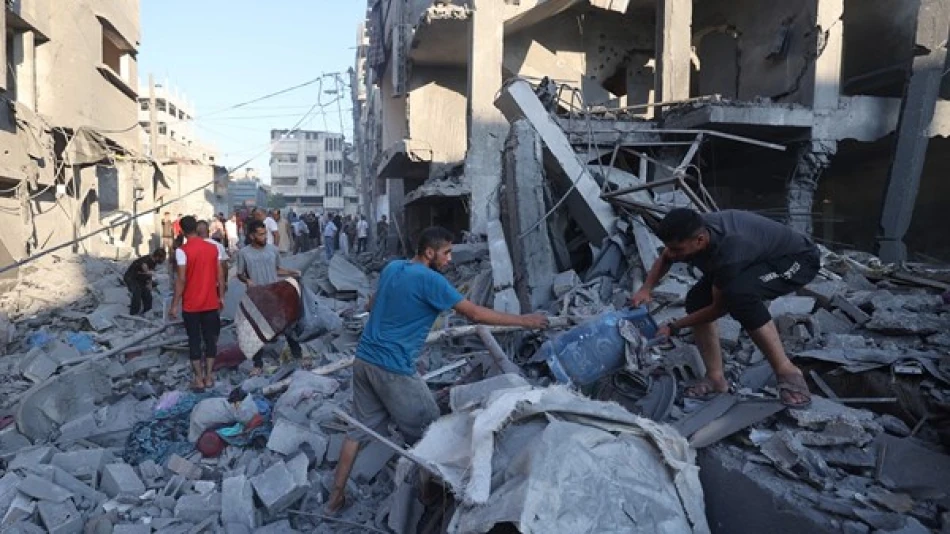
Qatar and Egypt Broker Ceasefire Progress in Gaza Conflict
Gaza Ceasefire Talks Show Signs of Progress Despite Temporary Suspension
Egypt and Qatar announced modest progress in the latest round of Gaza ceasefire negotiations on Friday, signaling that three weeks of intensive diplomatic efforts have yielded tangible results despite the temporary suspension of talks. The two mediating nations emphasized that pausing negotiations for consultations represents a normal phase in complex diplomatic processes, while reaffirming their commitment to securing a comprehensive agreement alongside the United States.
Diplomatic Breakthrough or Strategic Pause?
The joint statement from Cairo and Doha marks a cautiously optimistic tone after weeks of behind-the-scenes negotiations. Both countries described the recent three-week negotiation round as "intensive" and stressed that temporary suspensions for consultations are standard practice in multilateral diplomatic processes of this complexity.
"The two states indicate some progress has been achieved in the latest intensive negotiation round that lasted three weeks," the statement read, while acknowledging that "suspending negotiations to hold consultations before resuming dialogue again is natural in the context of these complex negotiations."
The Mediator's Balancing Act
Egypt and Qatar's roles as primary mediators reflect their unique positions in Middle Eastern geopolitics. Egypt's shared border with Gaza and historical peace treaty with Israel positions Cairo as a crucial gateway for humanitarian aid and diplomatic communication. Meanwhile, Qatar's financial resources and political relationships with various regional actors provide leverage that few other nations possess.
Strategic Partnership with Washington
The inclusion of the United States as a key partner in these negotiations underscores the Biden administration's continued engagement in Middle Eastern diplomacy. This trilateral approach mirrors successful diplomatic frameworks used in previous regional conflicts, where American political weight combined with Arab mediators' cultural understanding and regional credibility.
The mediators renewed their commitment to "continue efforts until reaching a comprehensive agreement in partnership with the United States," suggesting that Washington's involvement extends beyond mere endorsement to active participation in crafting terms.
Reading Between the Diplomatic Lines
The careful language used in Friday's statement reveals both the fragility and potential of current negotiations. The phrase "some progress" suggests incremental advances rather than breakthrough moments, indicating that negotiators are working through technical details rather than fundamental disagreements about core principles.
The emphasis on the "comprehensive" nature of any potential agreement hints at negotiations extending beyond immediate ceasefire terms to address longer-term issues such as humanitarian aid distribution, reconstruction frameworks, and security arrangements.
Historical Context and Precedent
Previous Gaza ceasefire negotiations have often followed similar patterns of intensive rounds followed by consultation periods. The 2014 conflict resolution took multiple rounds of Egyptian-mediated talks before achieving a lasting ceasefire, while the 2021 escalation was resolved more quickly through direct Egyptian intervention.
The current three-week negotiation period represents one of the longer sustained diplomatic efforts in recent years, suggesting that the scope of discussions may be broader than previous agreements. This extended timeline could indicate negotiations are addressing structural issues rather than merely tactical ceasefire terms.
Implications for Regional Stability
Any successful agreement emerging from these talks would likely have implications extending far beyond Gaza's borders. A comprehensive ceasefire framework could establish precedents for future conflict resolution in the region and potentially influence broader Israeli-Palestinian diplomatic processes.
The involvement of multiple mediators also creates accountability mechanisms that could enhance the durability of any eventual agreement, as violations would need to be addressed through established diplomatic channels rather than unilateral action.
Most Viewed News

 Layla Al Mansoori
Layla Al Mansoori






